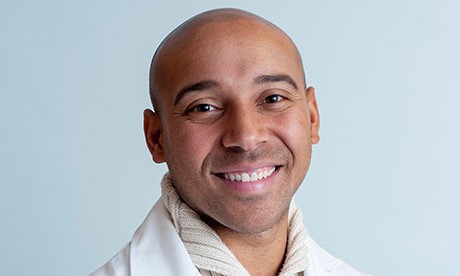News4 Minute ReadAug | 30 | 2021
Civic Health Month: Vote Like Your Health Depends on It!


The Mass General Brigham Community Care vans have gotten “on board” with Vot-ER this August in honor of Civic Health Month. After receiving the COVID-19 vaccine, patients will get a bandage with a QR code connecting them to the voter registration page. This will make registering to vote even easier for patients and community residents outside of the hospital walls.
Vot-ER is the brainchild of Alister Martin, MD, MPP, an emergency room (ER) physician at Mass General, Assistant Professor at Harvard Medical School - Faculty Center for Social Justice and Health Equity, Founder of Get Waivered, and the Founder of Vot-ER. In his role at Vot-ER, Dr. Martin helps build platforms that offer non-emergency patients a chance to register to vote in 90 seconds or less, using a combination of iPad kiosks and behaviorally informed posters, stickers and discharge paperwork. Non-emergency patients can access this platform while waiting in health care settings like doctors’ offices and health center waiting rooms.
“As an ER physician, I often see what’s not the result of a medical emergency,” Dr. Martin said.
“What I see are health policy and societal failures.” Dr. Martin explained that many patients coming to the ER struggle with housing and food insecurity and may have limited or no health insurance at all. This can cause significant burn-out among physicians because, “If all you see are patients struggling with upstream policy issues like access to affordable prescription medications, homelessness and food insecurity, and you don’t have a way to address that directly, it can feel like you aren’t making a difference.”
The COVID pandemic has illuminated the connection between health outcomes and voting. People who vote typically have the resources necessary to sustain themselves within their neighborhoods. “When it came time to deploy city and state vaccines, low-income communities were initially left behind nationwide,” Dr. Martin said, adding, “Where are the places where community health resources are lacking? They aren’t in the Back Bays of major cities—they are in the Chelseas and East Bostons.” Voting makes all the difference in health outcomes, and this is where the conversation should start. According to Dr. Martin, “Politically, if you are not at the table, then you are on the menu.”
Vot-ER gives physicians a chance to discuss with patients the importance of voting to address health inequities. “Our health care system is working just as it is supposed to when you’re not voting,” Dr. Martin said. He pointed to the direct connection between poor health outcomes and people who do not vote, saying, “[Approximately] 50 million people not voting? That’s the population of the entire country of Spain.”
During 2020, Vot-ER became the first-ever national voter registration done in hospitals. A total of 24,000 nurses, physicians and social workers used Healthy Democracy Kits to register nearly 50,000 patients to vote or help them get their mail-in ballots. These Healthy Democracy Kits included a voter-registration-themed lanyard and ID badges that were connected to a web infrastructure allowing people to use their phones to instantly register to vote. Thousands of Healthy Democracy Kits were shipped to community health centers, private clinics and ERs of many hospitals, and physicians would carry these ID badges on their lanyards. Noting that this initial success is just a fraction of their ultimate capability, Martin said, “The goal is to really spread this innovation in every hospital, community health center, and in every clinic. They don’t have to use Vot-ER, but they should do something to help patients vote.”
Dr. Martin’s passion to increase voter representation continues to make significant inroads. “Constitutionally, voting is the right of every citizen, so we should help patients vote,” he said. While Dr. Martin acknowledged the burden of voter registration when one is an essential worker, is working multiple jobs, or has significant family and childcare obligations, he said, “Everyone should know that their voice matters. Vot-ER continues to promote voter education, bringing hope and increasing the diversity of new voices that shape our democracy.” He added, “For every person who asks, ‘Am I worthy to vote?’ or ‘Does voting matter?’ the work Vot-ER does during Civic Health Month, a national celebration during the month of August of the intersection between health and voting celebrated by over 250 partnering organizations, is the answer. Yes, your vote matters! We want to help you vote like your health depends on it—because it does.”
-
![]()
- Assistant Professor, Harvard Medical School - Faculty Center for Social Justice and Health Equity
- Founder - Get Waivered
- Founder - VotER
Type
Centers and Departments
Center for Community Health Improvement
We bring together people and resources to address challenging health problems and foster sustainable improvement.
Center for Community Health Improvement
Focusing on the social determinants of health—factors such as housing, education, employment and access to care—CCHI brings together people and resources to address health inequities and build healthy, safe and thriving communities.

